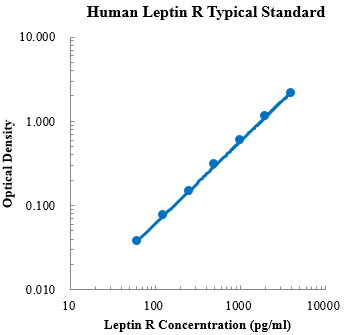
Human Leptin R ELISA Kit
$350.00 – $450.00
| Sample Type | Serum, plasma, cell culture supernatant, and other biological samples |
|---|---|
| Sample Volume | 100 μL |
| Sensitivity | 3.26 pg/mL |
| Range | 62.5 pg/mL – 4000 pg/mL |
| Assay Time | 3.5 h |
| Recovery | 82% – 118% |
| Average Recovery | 0.98 |
| Intra Precision | 4.3% – 4.6% |
| Inter-Precision | 3.2% – 4.0% |
| Platform | ELISA |
| Plate | Detachable 96-well plate |
| Size | 96T/48T |
| Storage | If the reagent kit is unopened, it should be stored at 4℃. However, if it has been opened, the standard solution should be stored at -20℃, while the other components should be stored at 4℃. |
| Delivery | 4℃ blue ice transportation |
| Components | 96-well polystyrene enzyme-linked immunosorbent assay (ELISA) plate coated with anti-Leptin R monoclonal antibody Human Leptin R freeze-dried standard Leptin R detect Antibody Standard Diluent Assay Buffer(10×) Substrate TMB Stop Solution Washing Buffer(20×) Sealing Film |
| Assay Principle | This kit utilizes the double antibody sandwich enzyme-linked immunosorbent assay (ELISA) detection technique.Specific anti-human Leptin R antibodies are precoated on a high-affinity ELISA plate. Standard samples, test samples, and biotinylated detection antibodies are added to the wells of the ELISA plate. After incubation, Leptin R present in the samples binds to the solid-phase antibodies and the detection antibodies. After washing to remove unbound substances, streptavidin-HRP labeled with horseradish peroxidase is added. After washing, a colorimetric substrate, TMB, is added and the plate is incubated in the dark for color development. The intensity of the color reaction is directly proportional to the concentration of Leptin R in the samples.A stop solution is added to terminate the reaction, and the absorbance value is measured at a wavelength of 450 nm (with a reference wavelength range of 570-630 nm). |

Targets
LEPR
LEPR Target Infomation Overview
- Target Symbol: LEPR, leptin receptor
- Gene Groups: CD molecules; Immunoglobulin like domain containing
- Alias: OBR; CD295
LEPR, leptin receptor Target Infomation by Species
Human LEPR Target Information
- Target Symbol: LEPR, leptin receptor
- Alias:
- CD295
- DKFZp686B1731
- huB219
- LEP-R
- LEPRD
- OB receptor
- OB-R
- OBR
- NCBI_Gene: 3953
- UniProtKB: P48357
Human LEPR Predicted Functions
Enables identical protein binding activity and leptin receptor activity. Involved in several processes, including angiogenesis; leptin-mediated signaling pathway; and negative regulation of autophagy. Part of receptor complex. Implicated in several diseases, including artery disease (multiple); non-alcoholic fatty liver disease (multiple); obesity; obstructive sleep apnea; and type 2 diabetes mellitus. Biomarker of arteriosclerosis; chronic obstructive pulmonary disease; human immunodeficiency virus infectious disease; liver disease (multiple); and sleep apnea.
Mouse Lepr Target Information
- Target Symbol: Lepr, leptin receptor
- Alias:
- db
- diabetes
- Leprb
- LEPROT
- leptin receptor gene-related protein
- Modb1
- OB-RGRP
- obese-like
- obl
- Obr
- NCBI_Gene: 16847
Mouse Lepr Predicted Functions
Enables leptin receptor activity. Involved in several processes, including energy homeostasis; leptin-mediated signaling pathway; and positive regulation of cold-induced thermogenesis. Acts upstream of or within several processes, including glial cell proliferation; glycogen metabolic process; and negative regulation of gluconeogenesis. Predicted to be located in extracellular space and plasma membrane. Predicted to be part of receptor complex. Predicted to be active in external side of plasma membrane. Is expressed in several structures, including alimentary system; central nervous system; genitourinary system; limb segment; and skeleton. Used to study non-alcoholic fatty liver disease; obesity; and type 2 diabetes mellitus. Human ortholog(s) of this gene implicated in several diseases, including artery disease (multiple); non-alcoholic fatty liver disease (multiple); obesity; obstructive sleep apnea; and type 2 diabetes mellitus. Orthologous to human LEPR (leptin receptor).
Rat Lepr Target Information
- Target Symbol: Lepr, leptin receptor
- Alias:
- Fa
- LEP-R
- Leptin receptor (fatty)
- OB receptor
- OB-R
- NCBI_Gene: 24536
Rat Lepr Predicted Functions
Enables peptide hormone binding activity and protein-hormone receptor activity. Involved in several processes, including gonad development; negative regulation of locomotor rhythm; and positive regulation of cell communication. Located in extracellular space and plasma membrane. Used to study several diseases, including chronic kidney disease; glucose metabolism disease (multiple); obesity; pancreatitis; and renal fibrosis. Biomarker of pre-eclampsia and short bowel syndrome. Human ortholog(s) of this gene implicated in several diseases, including artery disease (multiple); non-alcoholic fatty liver disease (multiple); obesity; obstructive sleep apnea; and type 2 diabetes mellitus. Orthologous to human LEPR (leptin receptor).



